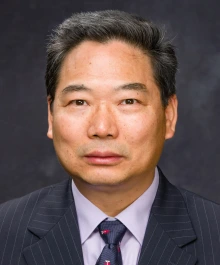College of Medicine – Tucson, Medicine
When
Where
Lecture Hall, Room 5403
1501 N. Campbell Ave., Tucson, AZ 85721
or
Topic

Priming the Proteasome to Alleviate Proteotoxicity
Presenter Details
Xuejun Wang, MBBS, PhD, FAHA, FISHR
Dr. Wang is a professor and director of the MD/PhD program at the University of South Dakota Sanford School of Medicine. He received his M.D.-equivalent and M.S. degrees from the Wuhan University College of Medicine in China and his Ph.D. in anatomy from the University of South Dakota. Following postdoctoral training at Cincinnati Children’s Hospital Medical Center, he joined the University of South Dakota as a faculty member in 2001 and became a full professor in 2006. Continuously funded by the NIH since 2002, Dr. Wang’s research focuses on protein quality control and degradation in cardiac pathophysiology, particularly the ubiquitin-proteasome system and autophagy. His pioneering work established the concept of proteasome functional insufficiency as a pathogenic mechanism in heart failure. He has written more than 200 publications with an H-index of 71 and has trained more than 30 pre- and postdoctoral fellows. He is the 2026 recipient of the American Physiological Society’s Carl J. Wiggers Award.
Department of Medicine Grand Rounds
Medicine Grand Rounds are held in Room 5403 on the fifth floor of the College of Medicine – Tucson. To view Medicine Grand Rounds remotely, see this live weblink: https://streaming.biocom.arizona.edu/streaming/. To view it after the fact, click on "Archive" at the top of this same link's webpage and, from the dropdown menu under "Category," select "Medicine Grand Rounds" and click "Search" to find the event you're seeking.
Accreditation Statement: The University of Arizona College of Medicine – Tucson is accredited by the Accreditation Council for Continuing Medical Education to provide continuing medical education for physicians.
The University of Arizona College of Medicine - Tucson designates this live activity for a maximum of 1 AMA PRA Category 1 credit. Physicians should claim only the credit commensurate with the extent of their participation in the activity.
Disclosure Statement: All faculty members, CME planning committee members and the CME office reviewers have disclosed that they have no financial relationships with ineligible companies that would constitute a conflict of interest concerning this CME activity.
Learning Objectives:
- Define protein quality control and proteotoxicity and describe the overarching mechanisms that govern PQC in the cell.
- Outline the current understanding of the roles of ubiquitin-proteasome system dysfunction, with an emphasis on proteasome functional insufficiency in heart disease.
- Evaluate the existing evidence for priming the proteasome to alleviate proteotoxic stress.
For questions or accommodations that may be necessary, please contact the Office of the Chair at 520-626-7174 at least three days in advance of the event. If you would like to participate in the Q&A portion of this lecture, email Crystal Escobar (crystalescobar@arizona.edu) for the Zoom link and password.

